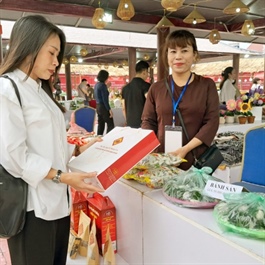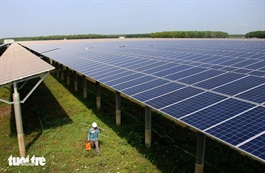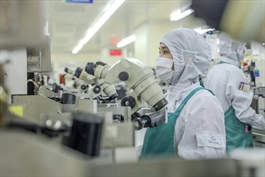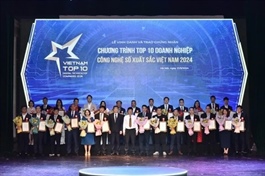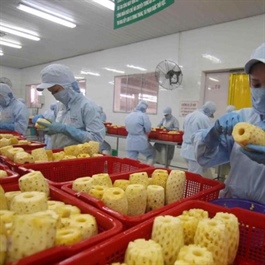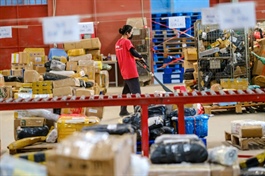Strategy issued to develop Việt Nam’s semiconductor industry
Strategy issued to develop Việt Nam’s semiconductor industry
Prime Minister Phạm Minh Chính has signed a decision issuing the strategy for developing Việt Nam’s semiconductor industry by 2030, with a vision to 2050.
|
Korea - invested semiconductor chip manufacturer Hana Micron Vina in Bắc Giang Province. Việt Nam has a clear roadmap for the development of the semiconductor industry by 2030 with a vision to 2050. — VNA/VNS Photo Tuấn Anh |
Accordingly, three distinct phases will be planned, with clear targets and specific numbers, including hundreds of new companies, to develop the country's semi conductor industry.
The development map was signed by Prime Minister Phạm Minh Chính on Saturday with a new strategy for developing Việt Nam’s semiconductor industry by 2030, with a vision to 2050.
The strategy outlines a roadmap for developing the industry according to the formula of C = SET + 1 (C stands for Chip, S for Specialised, E for Electronics, T for Talent, and + 1 for Vietnam, which will strive to become a new and safe destination of the global semiconductor supply chain).
The country plans to develop the industry in three phases.
In the first period, from 2024 - 30, it will use geopolitical and workforce advantages, selectively attract foreign direct investment (FDI), establish itself as one of the global semiconductor manpower centres, and grow fundamental capacity in all steps, from research, design, and manufacturing to packaging and testing.
In the second from 2030 - 40, Việt Nam will work to become a global semiconductor and electronics centre while developing the semiconductor and electronics industries that combine both self-reliance and FDI.
For the third phase from 2040 - 50, Việt Nam is aiming to become one of the world’s leaders in the semiconductor and electronics industries and master research and development (R&D) in these fields.
Identifying concrete targets for each period, in Phase 1, the country will selectively attract FDI, form at least a hundred design companies, one small-scaled manufacturing factory and ten packaging and testing plants and develop some specialised semiconductor products for several sectors.
The semiconductor industry hopes to secure annual revenue of more than US$25 billion and an added value growth rate of 10 – 15 per cent. Meanwhile, the electronics industry targets over $225 billion in annual revenues and 10 – 15 per cent in added value growth.
The semiconductor workforce will include more than 50,000 engineers and graduates to meet development demand during 2024 - 30.
In Phase 2, Việt Nam will develop a semiconductor industry combining both self-reliance and FDI, with at least 200 design companies, two manufacturing factories and 15 packaging and testing plants and gradually ensure self-sufficiency of design and production technologies for specialised semiconductor products.
It targets respective annual revenues of over $50 billion and $485 billion for the semiconductor and electronics industries, which are expected to record an added value growth rate of 15 – 20 per cent.
Meanwhile, more than 100,000 semiconductor engineers and graduates will be ready to work during the period 2030 - 40.
In Phase 3, there will be at least 300 design companies, three manufacturing factories and 20 packaging and testing plants. The country is also set to master semiconductor R&D.
The semiconductor and electronics industries are expected to post respective annual revenues of more than $100 billion and $1.045 trillion, as well as a growth rate of 20 – 25 per cent in added value.
At that time, the semiconductor workforce will feature an appropriate structure and numbers meeting development demand.
Vietnam will complete a self-reliant semiconductor industry ecosystem taking the lead in some steps and segments of the production chain during 2040 - 50, according to the strategy.
To that end, five major tasks with detailed implementation measures are also specified.
Focus on human resources
On the same day, Deputy Prime Minister Lê Thành Long signed Decision No. 1017/QĐ-TTg approving a programme on developing human resources for the semiconductor industry until 2030 with a vision to 2050.
Under the decision, Việt Nam aims to train and develop high quality human resources for the semiconductor industry by 2030 and a strong contingent of semiconductor personnel capable of joining the global value chain of the industry by 2050.
Specifically, by 2030, Vietnam expects to have at least 50,000 engineers and workers with bachelor's and higher degrees in all stages of the semiconductor value chain, along with at least 5,000 personnel with intensive expertise in AI serving the semiconductor industry.
The country will provide intensive training in semiconductor industry for 1,300 lecturers, while establishing, upgrading and modernising four national-level laboratories along with local-level laboratories at eight public higher education institutions in the northern, central and southern regions to serve the training of human resources.
By 2050, the country hopes to meet the domestic human resources demand in both number and quality in all stages of the semiconductor value chain and form a system of training institutions, especially higher education institutions capable of training high-quality human resources to serve the development of Vietnam's semiconductor industry.
To achieve the goals, the decision clarified seven major groups of tasks and solutions, including those on developing and perfecting specific mechanisms and policies, investing in infrastructure, facilities and technology for training, organising training activities, mobilising and diversifying resources, building an ecosystem, creating output for human resources, supporting business development and promoting research and development (R&D) activities.
The funding for the implementation of the programme will come from the State budget, enterprises, organisations, individuals and other legal sources.
The Ministry of Planning and Investment was assigned to be responsible for coordinating, supervising and evaluating the implementation of the programme.
The Ministry of Education and Training was ordered to direct and guide higher education institutions to develop training projects, select training programmes for higher education institutions and issue training plans.
Meanwhile, the Ministry of Finance was requested to allocate capital for the progamme in line with legal regulations.







